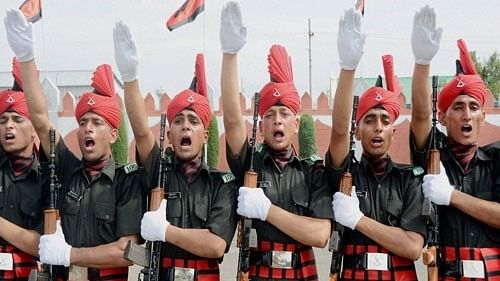
Army recruits taking oath. Representative Image.
Credit: PTI Photo
New Delhi: The Supreme Court has told the Army authorities to reinstate four personnel terminated from services in 2013 for allegedly producing fake relationship certificates, after finding that they never sought any concession in the recruitment process.
A bench of Justices Bela M Trivedi and Pankaj Mithal, in its judgement on February 9, said the dismissal of the appellants from service after three years of recruitment was vitiated for non-consideration of their specific case that they have actually not produced any relationship certificate for selection.
"There is no whisper that any inquiry was conducted to ascertain or find out as to whether the appellants had actually produced relationship certificates for the purposes of enrolement/recruitment in the Army," the bench said.
The court also noted the Armed Forces Tribunal acted in "causal and routine manner" to uphold the discharge order without addressing the core issue, whether any relationship certificate was produced by the appellants.
The court found the Union government and Army authorities could not produce any record that the recruitment in December, 2009 under the Unit Headquarters Quota at the Maratha Light Infantry Regimental Centre was not open for general category.
The appellants, on the contrary, produced Xerox copy of their forms, which showed they did not claim any relationship with servicemen or ex servicemen to seek recruitment.
The Centre's counsel, however, sought to reply upon Deccan Herald's news clipping of September 27, 2009, placing before the bench across the Bar for perusal.
The bench, however, said, "It is not at all appropriate for this court to consider and rely upon it."
Nonetheless, the court noted, its plain reading revealed that it is not an advertisement inviting applications for enrollment or recruitment under the Unit Headquarters Quota.
"It is simply a news item published in the newspaper informing that such an exercise for enrollment/recruitment under the Unit Headquarters Quota is going to take place without specifically stating that general category candidates who do not have any relationship with servicemen/ex servicemen are prohibited or barred from applying," the bench said.
The news item also clearly belied the stand taken by the defence that the enrollment or recruitment was only meant for the relatives of the servicemen or ex-servicemen and was not open for the general category, the bench pointed out.
The court said the core issue arising in the matter was missed not only by the authorities concerned but by the Armed Forces Tribunal as well.
"The tribunal in a casual and routine manner affirmed the discharge/dismissal order simply holding that the relationship certificates produced by the appellants have been found to be fake even upon verification. The tribunal also seems to have lost sight of the crucial point that the appellants have applied under the general category and not as relatives of servicemen/ex-servicemen. They have not produced the alleged certificate(s) which could be held to be fake," the bench said.
The court set aside dismissal order of May 9, 2013 and the tribunal's orders of November 18, 2015.
The Army authorities terminated services of about 52 recruits on the basis of either the fake sports person certificate or false relationship certificate.
However, after some litigation, candidates belonging to the category of sportsmen of merit, were all reinstated. Of 20 persons who were discharged for fake relationship certificate, four recruits filed appeals before the top court.
